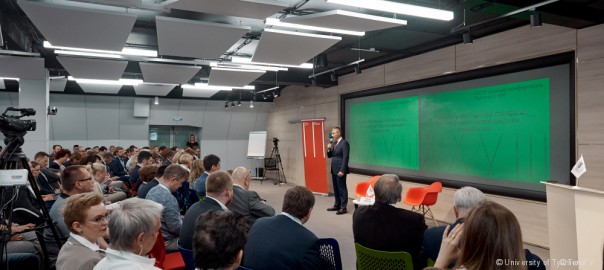On September 20-21, 2019, the University of Tyumen (UTMN) hosted Project 5-100’s 28th Seminar-Conference. Project 5-100 is a government-funded initiative aimed at making Russia’s premier universities more competitive globally.
The forum called “Greenfield Projects in Research and Education as Tools for University Transformation” brought together leading experts in higher education and research, presidents of Russian universities, high-tech company officers and government officials. The discussion focused on the development of greenfield institutions in education, which involves building academic infrastructure from the ground up and implementing innovative projects from scratch. Such institutions differ from traditional ones in terms of academic scope, format, and organization.
The seminar-conference was held at UTMN’s School of Advanced Studies (SAS), a research and educational unit of a new type which the university inaugurated in 2017 within the framework of Project 5-100. SAS aims to make a contribution to the global discussion of current issues in humanities and social studies, including their interactions with biological and IT sciences, and provide unique, top-quality education to Russian and international students.
UTMN Rector (President) Valery Falkov credits Project 5-100 with facilitating the university’s transformation. Instead of having to choose between launching greenfield projects in specific areas and introducing small changes across the board, UTMN was able to opt for a combination of the two, a decision which it now has reason to regard as the right one. It has set up two greenfield facilities while also pushing ahead with an overall, systemic transformation. Joining Project 5-100 gave UTMN a chance to overhaul itself, and the university seized it, says Valery Falkov.
Issues involving the launch and implementation of greenfield projects and their potential to act as drivers of university transformation took center stage at the session titled Greenfield Projects at University. It was moderated by Andrei Volkov, Deputy Chairman of the Council for Increasing the Competitiveness of Russia’s Leading Universities and an academic policy adviser to the Moscow School of Management SKOLKOVO. He selected for special mention the following greenfield institutions operated by universities that participate in Project 5-100: School of Data Economy at Far Eastern Federal University (FEFU); Research and Educational Center “Fundamental and Applied Photonics. Nanophotonics” at Immanuel Kant Baltic Federal University (IKBFU); Engineering School at Novosibirsk State University (NSU); Institute of Engineering Physics for Biomedicine at National Research Nuclear University MEPhI; Faculties of Computer Sciences, Physics and Chemistry at National Research University Higher School of Economics (HSE); Institute of Design and Urban Studies at ITMO University; SAS at UTMN; Higher IT School and a BA course in Program Engineering at Tomsk State University (TSU), etc.
However, as Andrei Volkov underlined, creating institutions from scratch is not the only way for higher education providers to effect a transformation. Another means to this end is brownfield projects, which envisage upgrading existing facilities and processes to make them more efficient. Several Project 5-100 universities have such projects up and running. The most notable examples include the Faculty of Communications, Media and Design at HSE, the Ural Institute of Humanities at Ural Federal University (UrFU), the Higher School of Journalism at TSU, the Institute of Environmental and Agricultural Biology (X-BIO) at UTMN, and the Faculty of Technological Management and Innovations at ITMO University. According to Marat Fatkhullin, Vice President at Elsevier, one of the world’s top academic publishers, university transformation is often a bottom-up affair. Thus, it was a journey abroad by a Sechenov University student in 2016 that led to the launch of the UK-Russia Young Medics Conference which the university now holds annually in conjunction with the British Embassy in Russia. Attended by more than 500 people, this event helps attract international grants and promote global cooperation in medicine. In another instance, MEPhI’s focus on applying physical science techniques to cancer therapy has enabled it to diversify its curriculum and build an educational program on other principles and models than those sanctified by tradition.
A third case involves UrFU. As the university confronted the problem of unstructured data within its own systems and those of commercial providers, including publishers, it approached Elsevier and launched not just a greenfield project of its own but one running within Elsevier on the innovative Research Operational System (ROS), currently being trialed, said Marat Fatkhullin.
There is a consensus among experts that transitioning to new educational institutions and carrying out a systemic overhaul of existing ones is a demanding task. No less daunting are the challenges facing young universities, such as HSE. Vice Rector (Vice President) Sergey Roshchin describes HSE as one big greenfield project. When the university came into being 27 years ago it only taught economics and social sciences, whereas now it runs an array of about 300 educational programs in some 50 areas, operates four campuses and is home to 45,000 students. Sergey Roshchin’s analysis of its performance as a greenfield institution has convinced him of the need to test all greenfield projects for scalability, provide for their adjustment to a changing environment and develop a clear set of internal regulations to govern their operations. He stresses that greenfield projects cannot be pursued in isolation from the outside world but must interact with it to achieve their goals most efficiently.
It is hard to conceive of university life over the next few years without daring attempts to build another kind of education and research and introduce game-changing technological innovations – that is, without greenfield efforts. Evolutionary development or modernization alone cannot ensure success, concluded Andrei Volkov.
Project 5-100 runs quarterly seminar-conferences to help implement programs aimed at rendering Russia’s premier universities more competitive globally. These events provide universities and their partners with a platform for sharing expertise, studying success stories, analyzing performance and enhancing faculty competence. Over the years, they have evolved into a major forum for the academic and expert community to engage in earnest discussion and exchange of opinions, showcase innovative solutions and promulgate the best practices of top Project 5-100 participants among dozens of Russian universities that attend the meetings.
The next, 29th, seminar-conference will be held on November 18-19, 2019, at the Plekhanov Russian University of Economics.
Originally published at 5top100


